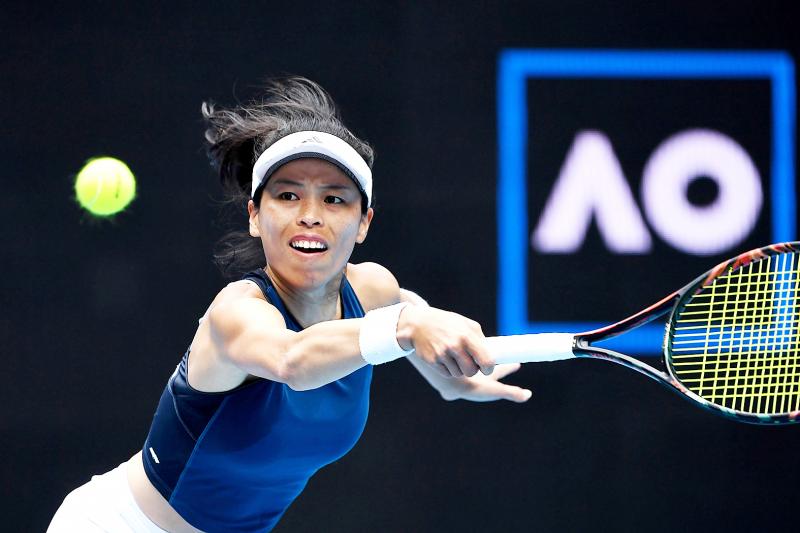Taiwan’s Hsieh Su-wei (謝淑薇) yesterday said that believing she was “still young” helped her sweep into a first Grand Slam quarter-final after 16 years of trying, becoming the first female player from Taiwan to reach a women’s singles quarter-final in a Grand Slam event, as well as the oldest player to make a last-eight debut in the Open era.
The 35-year-old overwhelmed Czech Marketa Vondrousova, a player 14 years her junior, in the Australian Open fourth round to set up an all-Asia clash with Japan’s Naomi Osaka.
Hsieh, the doubles world No. 1, but ranked No. 71 in singles, got an early break in the opening set and never looked troubled in outwitting the 19th seed 6-4, 6-2, a player she also toppled in a warm-up event in Abu Dhabi last month.

Photo: AFP
The Taiwanese made her Grand Slam debut in 2005, but had never gone beyond the fourth round before in 37 previous attempts.
“I try to pretend I’m only 18 years old. My mental [age] is very young,” Hsieh said on her secret for success.
“I also try to look little bit young this time, it helps a lot,” she said with a smile. “For me, the most important thing is to stay happy, to enjoy it, not get injury.”
Hsieh, by far the least decorated player left in her side of the draw, had already shown her mettle on Wednesday last week by beating 2019 US Open champion Bianca Andreescu.
One of the most unorthodox players in the women’s game, Hsieh won 80 percent of her first-service points against Vondrousova, who was hampered by 31 unforced errors.
Asked how she had been able to maintain her level over so many years, Hsieh recounted a story about how her boyfriend’s parents almost fell asleep when they first came to watch her at the French Open.
“Before Roland Garros, I was never able to beat the top-10 player,” Hsieh said. “I was dating my boyfriend, it was first year or second year, but his parents was first time coming to watch my match.”
“So I see the parents, I think they look like they’re going to fall asleep. I think I play really bad,” she said. “I tell myself: ‘OK, now I don’t care what happen, I will try to get every ball, try to make it look little bit better.’ At least I want to see them a little bit awake. That’s the way I get back, win the set and win the match. After that, I start winning [against] some top-10 players.”
Hsieh did not say when this happened, but before meeting Osaka she has a 8-25 record against top-10 players, with four of the wins coming at Grand Slams, including victory over Britain’s Johanna Konta, then ranked No. 8, at the 2017 French Open.
Additional reporting by staff writer

A magnitude 7.0 earthquake struck off Yilan at 11:05pm yesterday, the Central Weather Administration (CWA) said. The epicenter was located at sea, about 32.3km east of Yilan County Hall, at a depth of 72.8km, CWA data showed There were no immediate reports of damage. The intensity of the quake, which gauges the actual effect of a seismic event, measured 4 in Yilan County area on Taiwan’s seven-tier intensity scale, the data showed. It measured 4 in other parts of eastern, northern and central Taiwan as well as Tainan, and 3 in Kaohsiung and Pingtung County, and 2 in Lienchiang and Penghu counties and 1

FOREIGN INTERFERENCE: Beijing would likely intensify public opinion warfare in next year’s local elections to prevent Lai from getting re-elected, the ‘Yomiuri Shimbun’ said Internal documents from a Chinese artificial intelligence (AI) company indicated that China has been using the technology to intervene in foreign elections, including propaganda targeting Taiwan’s local elections next year and presidential elections in 2028, a Japanese newspaper reported yesterday. The Institute of National Security of Vanderbilt University obtained nearly 400 pages of documents from GoLaxy, a company with ties to the Chinese government, and found evidence that it had apparently deployed sophisticated, AI-driven propaganda campaigns in Hong Kong and Taiwan to shape public opinion, the Yomiuri Shimbun reported. GoLaxy provides insights, situation analysis and public opinion-shaping technology by conducting network surveillance

‘POLITICAL GAME’: DPP lawmakers said the motion would not meet the legislative threshold needed, and accused the KMT and the TPP of trivializing the Constitution The Legislative Yuan yesterday approved a motion to initiate impeachment proceedings against President William Lai (賴清德), saying he had undermined Taiwan’s constitutional order and democracy. The motion was approved 61-50 by lawmakers from the main opposition Chinese Nationalist Party (KMT) and the smaller Taiwan People’s Party (TPP), who together hold a legislative majority. Under the motion, a roll call vote for impeachment would be held on May 19 next year, after various hearings are held and Lai is given the chance to defend himself. The move came after Lai on Monday last week did not promulgate an amendment passed by the legislature that

AFTERMATH: The Taipei City Government said it received 39 minor incident reports including gas leaks, water leaks and outages, and a damaged traffic signal A magnitude 7.0 earthquake struck off Taiwan’s northeastern coast late on Saturday, producing only two major aftershocks as of yesterday noon, the Central Weather Administration (CWA) said. The limited aftershocks contrast with last year’s major earthquake in Hualien County, as Saturday’s earthquake occurred at a greater depth in a subduction zone. Saturday’s earthquake struck at 11:05pm, with its hypocenter about 32.3km east of Yilan County Hall, at a depth of 72.8km. Shaking was felt in 17 administrative regions north of Tainan and in eastern Taiwan, reaching intensity level 4 on Taiwan’s seven-tier seismic scale, the CWA said. In Hualien, the